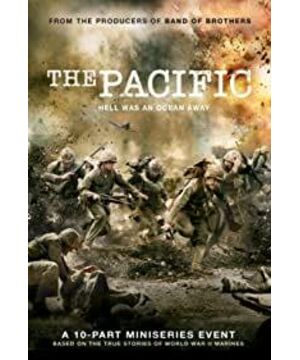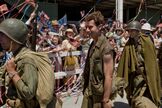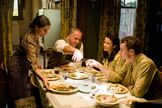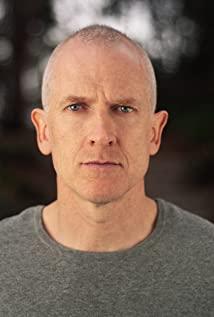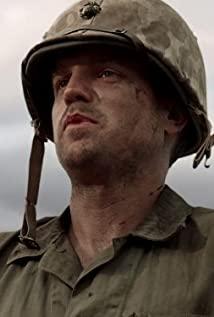The production and broadcasting team of "Wind and Rain" is almost the same as "Brothers": broadcast on HBO, Spielberg's DreamWorks and Tom Hanks's Stone Play. And the style of the route can’t help but make people think that this is the sister chapter of "Brothers"-the story line adapted from real life, the veteran's narrative at the beginning of the series and even the title font are very similar. Because Michael Carmen, the soundtrack for "Brothers" has already gone, Spielberg invited his old friend Hans Zimmer. The opening song he created is grand and tragic, and very contagious. In fact, the title production of "Wind and Rain" almost surpassed "Brothers": the style of charcoal swaying not only points out the documentary style of depicting history, and the slow motion of powder splashing seems to be flying on the battlefield. Bullet stones, one by one sketches freeze the characters, as if they have captured the moments of history... Coupled with the documentary clips at the beginning of each episode, "Wind and Rainy Pacific" has revealed the goal of "recovering history" from the beginning of the film.
So, is this drama really a sister chapter of "Brothers"? After a few episodes were aired, many viewers (including American audiences) complained that the episodes had too few war scenes and were not intense enough; the plot development was not as compact and clear as in "Brothers". It seems that a comparison is always inevitable.
First of all, from the perspective of length, although the same is ten episodes (the screenwriter of this play originally wrote 13 episodes, but due to budget and other reasons, it was cut to ten episodes), but "Brothers" is a 70-minute episode. The set is only 50 minutes. After ten episodes, 200 minutes were missing! It's almost equivalent to missing the length of an epic movie. In other words, each episode of "Brothers" is like a movie, ten movies link the whole story; while this show is more like breaking a big movie into ten parts, watching some episodes alone is really not full enough. It feels like a little bit of water. The battle scene is far less than imagined, and there is no grand scene as imagined-the famous "Tokyo Express" (the Japanese fleet bombards Guadal Island) only gave a small picture, and Iron Bottom Bay was basically not involved. A vigorous battle of Guadalcanal Island actually took only one battle to pass the past, the major battle of Iwo Jima only gave half of the content. Audiences who don't understand the background will be confused. After all, everyone is familiar with the European battlefield, so I feel that the whole clue of BOB ("Brothers") is very clear. The first few episodes of "Wind and Rain in the Pacific" may make people feel that the battle was in a mess. Most of the time, soldiers were fighting against the environment, and then the US military won inexplicably. Of course, objectively it is also because the Marine Corps is not the protagonist of the Pacific battlefield. Although they have been successful in capturing the island, the biggest contributors to this war are the U.S. Navy and Air Force. Moreover, the entire Pacific battlefield is not as turbulent as the European battlefield. Even with MacArthur's leapfrog tactics, the overall situation is still honestly bit by bit.
I personally think that Lao Si, Hanks and others who built BOB wanted to change in this play. They didn’t want to turn "Wind and Rainy Pacific" into just a copy of BOB-the Pacific War was originally fragmented. The material and BOB are very different. If "The Brotherhood" is a narrative drama, then "Wind and Rain in the Pacific" is freehand, depicting a silhouette of war and soldiers. If "Brothers" focuses on showing the historical situation, then "Wind and Rain" focuses on the psychological level of soldiers. So it seems that this drama has a somewhat literary taste that is closer to "Thin Red Line"-some people say that the fourth episode is simply the battlefield version of "Flying Over the Cuckoo's Asylum", and the psychological trauma caused by war runs through the whole episode. BOB is very different, although there is also an episode in BOB that is completely about concentration camps. In addition, "Brothers" takes a company as the core of the plot. The story is very concentrated and complete. The structure is organized around Winters. The clues are sometimes interspersed and the clues are clear. The whole drama always focuses on brotherhood in war; "Wind and Rain" It is jumping among the three characters in different companies, the perspective is not uniform, and it is a bit of scattered perspective in Chinese painting. More emotional drama and family drama than BOB. This kind of difference can also be felt from the shooting method: "Brothers" is closer to Spielberg's "Saving Private Ryan", which is mostly used for hand-held shooting, and DV-style shaking lenses are used to express the sense of reality and presence; "The Wind and Rain" "Pacific" returns to the traditional style of fixed-shot shooting.
From the previous episodes, the feeling brought by "Wind and Rainy Pacific" is obviously not as strong and enjoyable as BOB. The overall level is somewhat different from this kind of magical work, but this definitely does not mean that the level of the show is not high. The following episodes describing the Battle of Peleliu Island will have very exciting battle scenes, and more importantly, because the Pacific War has always been carried out in the tropical rainforest with a harsh environment, its spiritual impact on people is more terrible than the European battlefield. Many, the series has made a lot of efforts and attempts in this regard. If you regard it as the TV series version of "Thin Red Line", I think it is still very good and worthy of taste.
View more about The Pacific reviews


